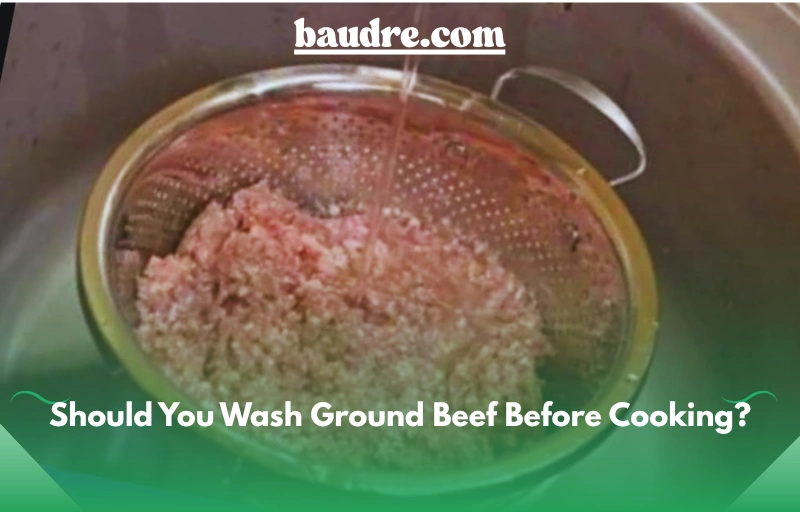Understanding the Debate: Health, Taste, and Safety
Ground beef is a staple in many kitchens, known for its versatility in everything from tacos to casseroles. But a common question often arises: should you rinse ground beef before or after cooking? While some believe rinsing helps reduce fat and calories, others argue it compromises flavor and texture.
This guide explores both sides of the debate to help you make an informed choice based on your cooking goals and preferences.

Why Some Cooks Rinse Ground Beef
Reducing Fat and Calories
One of the main reasons people rinse ground beef is to lower its fat content. When using varieties like 80/20 (80% lean, 20% fat), draining and rinsing with hot water may reduce visible grease and decrease overall calorie count.
Benefits may include:
- Less oily texture in dishes like chili, taco filling, and pasta sauces
- Improved appeal for low-fat and heart-healthy diets
- Reduced saturated fat, which can be important for individuals managing cholesterol levels
Better Blending with Other Ingredients
Rinsing cooked ground beef can help it mix more easily into other components of a dish. This can be helpful in recipes like lasagna, stuffed peppers, or casseroles where grease can affect texture or appearance.
Why Many Chefs Avoid Rinsing Ground Beef
Loss of Flavor and Juiciness
Fat carries flavor and helps maintain moisture during cooking. When you rinse ground beef, especially after browning, you’re likely removing flavorful juices and oils that contribute to the taste and richness of the dish.
Skipping the rinse can:
- Enhance the savory depth of your meal
- Promote better browning and caramelization
- Preserve the beef’s natural tenderness
Potential for Texture Issues
Rinsing cooked beef under water can introduce excess moisture. If not drained thoroughly, this can leave your meat watery, dilute sauces, or negatively impact dishes like tacos or meatloaf that rely on firmer textures.
Cleaning Concerns: Is Rinsing Worth the Mess?
Grease and Water Don’t Mix Well
Rinsing hot beef in the sink can result in:
- Grease splattering on surfaces and stovetops
- Clogged drains from solidified fat
- Slippery residues that require extra cleaning
A cleaner, safer method is to cook the beef thoroughly, drain it in a colander, and press with paper towels to absorb remaining fat—without using water at all.
Important Food Safety Considerations
What the USDA Says About Washing Meat
The U.S. Department of Agriculture (USDA) advises against rinsing raw meat, including ground beef, due to the risk of spreading harmful bacteria like Salmonella or E. coli.
Key points to remember:
- Water doesn’t kill bacteria—it spreads it
- Splashing meat juices can contaminate sinks, counters, and nearby items
- Cooking to the proper internal temperature (160°F / 71°C) is the only reliable way to kill bacteria in ground beef
If your goal is fat reduction, choosing a leaner grind like 93/7 or 95/5 is safer and more effective than rinsing raw meat.
What About Rinsing After Cooking?
A Mild Approach to Lower Grease
Some people rinse ground beef after it’s cooked, especially when preparing lighter meals or using the meat in salads or lettuce wraps. This can reduce surface grease, but it’s not the only method available.
Alternatives include:
- Using a slotted spoon to remove cooked meat from the pan
- Letting the meat rest on paper towels to absorb excess fat
- Diluting sauces slightly with broth or water to cut oiliness
Pros and Cons of Rinsing Ground Beef
Advantages
- Reduces visible fat and calorie content
- Creates a cleaner look for certain recipes
- Supports low-fat and heart-friendly diets
- Minimizes greasy texture in dishes like soups or baked meals
Disadvantages
- Removes flavor-rich fat and juices
- May leave the beef dry or bland
- Increases the risk of contamination if rinsing raw meat
- Adds unnecessary cleanup and can damage plumbing
Final Verdict: Should You Rinse Ground Beef?
Whether or not you rinse ground beef depends on your cooking priorities:
You may choose to rinse if:
- You’re using high-fat ground beef and want to cut calories
- The recipe calls for minimal grease
- You follow a low-fat or heart-conscious diet
You may skip rinsing if:
- You’re using lean ground beef
- Flavor and moisture are essential for your dish
- You want to minimize mess and health risks
Choose the Method That Works for You
There’s no universal answer—only what works best for your kitchen and lifestyle. Ground beef is adaptable, and how you prepare it can be tailored to your tastes, health needs, and recipe goals.
Whether you rinse or not, the most important thing is safe handling, proper cooking, and making meals you enjoy.
